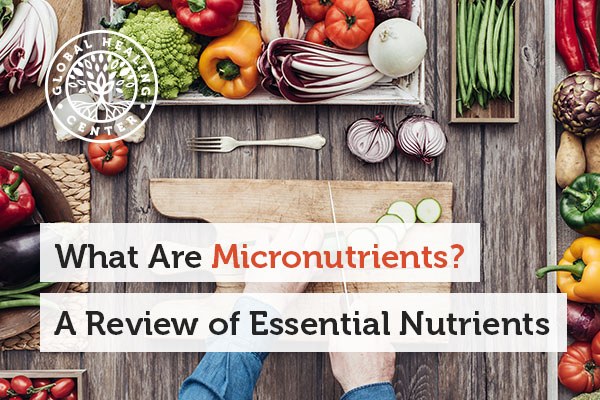
Micronutrients are the vitamins and minerals required by your body. Unlike macronutrients, you only need minuscule amounts of micronutrients to maintain good health. Micronutrients are essential to the production of enzymes, hormones, proteins, and other products created by your body. Some micronutrients have a specialized role, while others fulfill a broad range of functions.
Micronutrients are incredibly important for health and wellness. Mineral deficiencies can have lasting, detrimental health consequences in children and adults of all ages. Unborn children and older adults are especially susceptible to micronutrient deficiencies, which is why many nutritional supplements are optimized for specific age groups and many staple foods, like flour, are fortified with vitamins and minerals.
However, you might be surprised to learn that food fortification can be misleading as it's often accomplished with synthetic vitamin variants. These manufactured vitamin forms often lack the cofactors and nutrients required for proper absorption in the body. As always, it’s best to obtain naturally occurring vitamins and minerals from quality, whole-food dietary sources to ensure your body can properly utilize these essential nutrients.
What Are Vitamins?
Vitamins are organic compounds primarily derived from food that the body needs in small amounts. With the exception of vitamin D, vitamins cannot be produced by the organism that requires them. Vitamins serve a variety of purposes. Some, like vitamins A, C, and E, are antioxidants. Others, like the B vitamins, are vital for fetal brain development and healthy brain aging.[1, 2] There are two categories of vitamins — fat-soluble and water-soluble.
Fat-Soluble Vitamins
Vitamins A, D, E, and K are fat-soluble vitamins. Your body stores fat-soluble vitamins in fatty tissues for reserves in case you don’t meet your daily recommended intake. These vitamins are best consumed with healthy fats to ensure absorption.
Vitamin A
Vitamin A is essential for eye and brain health. It also regulates growth and keeps the immune system healthy. Plant sources are the safest method of meeting your daily vitamin A requirement. Consumption of vitamin A from animal sources could lead to vitamin A toxicity.[3]
Vitamin D
Vitamin D is both a hormone and a micronutrient. Though it’s famous for its role in preserving and promoting bone health, it also helps keep your respiratory system healthy, enhances your mental and emotional well-being, and keeps your immune system functioning at peak efficiency.[4, 5]
Vitamin E
Vitamin E is a powerhouse antioxidant. The various forms of the vitamin all have similar antioxidant properties, but one in particular, alpha-tocopherol, is what the body prefers most. Vitamin E protects delicate lipids from oxidation and, in the case of food, rancidity. Its actions protect your DNA by stopping free radicals from damaging the fragile structure of your chromosomes.
Vitamin K
Vitamin K is named after the German spelling of coagulation (koagulation) because it activates the proteins in blood that are responsible for clotting.[6]
Water-Soluble Vitamins
In humans, the water-soluble vitamins are limited to the B-complex vitamins and vitamin C. These vitamins need to be replaced on a daily basis because they are not easily stored in the body. Rather, the body excretes excess water-soluble vitamins in urine.
B-Complex Vitamins
The B-complex vitamins include thiamin (B1), riboflavin (B2), niacin (B3), pantothenic acid (B5), pyridoxine (B6), folic acid (B9), and cobalamin (B-12). These vitamins regulate the release of energy in cells (metabolism), serve as cofactors, and affect mood and immune health. Additionally, a healthy microbiome is essential because some probiotics actually generate B-vitamins in the gut.
Vitamin B12 and B9 are vitally important to brain health.[7] Research into the role of vitamin B12 suggests it’s a powerful force in preserving memory and cognitive function as you age.[2]
Vitamin C
Vitamin C’s role as an antioxidant is well known (and highly marketed), but it has other roles, too. Vitamin C is incredibly important for growth and healing. The strength of connective tissue and bones and skin elasticity all depend on sufficient levels of vitamin C. It also enhances the absorption of iron from food in the small intestine.[8]
What Are Minerals?
In general, minerals are inorganic, naturally occurring substances. In your diet, they are important nutrients that enable your cells to carry out essential functions. Minerals are divided into macrominerals and trace minerals, also known as microminerals. Predictably, your body requires macrominerals in much larger amounts than the trace minerals.
Macrominerals
The macrominerals include magnesium, sulfur, and the electrolytes: potassium, calcium, sodium, chlorine, and phosphorous. Most people get much more sodium chloride (table salt) than they need — to the detriment of their health. While some salt is essential, you don’t need nearly as much as most Americans consume. Try to limit your salt intake whenever possible.
Magnesium
Magnesium is not one of the celebrity micronutrients, but it is essential to many vital processes. It plays an important role in metabolism, acting as a cofactor in hundreds of chemical reactions in the body. Magnesium is also vital to proper bone formation and the synthesis of genetic material.[9]
Calcium
Of all the minerals, you may be most familiar with calcium, the most abundant mineral in the body. Far beyond bone strength, calcium is responsible for muscle and blood vessel relaxation and contraction, nerve firing, and communication between cells.[9]
Potassium
Most Americans, an astounding 98 percent, fall woefully short on potassium intake.[10] Potassium is responsible for muscle and nerve function, a steady heartbeat, and cell detoxification. It acts as the inverse of sodium, which is why it’s vital to balance your sodium and potassium intake.[11]
Trace Minerals
The body requires significantly fewer essential trace minerals (microminerals) than macrominerals. Macrominerals are measured in grams, while trace minerals are measured in milligrams and micrograms. The top microminerals you need are chromium, iron, iodine, selenium, manganese, zinc, molybdenum, and copper. You also need exceptionally small amounts of nickel, silicon, vanadium, and cobalt.[12]
Though you need less of these micronutrients, they are extremely important to your health. Many of the most pernicious health conditions are related to deficiencies in trace minerals like iodine and iron. According to the World Health Organization, an estimated 1.6 billion people worldwide have a reduced ability to work due to iron deficiency anemia. Annually, nearly 20 million children are born to mothers with insufficient iodine levels — a condition that leads to severe cognitive impairment.[13]
Micronutrients and Nutrition
There are only a few ways to meet your micronutrient needs: a nutrient-rich diet, quality supplementation, and, to a lesser degree, eating some types of clay or cooking in cast iron. Vitamins and minerals are easily synthesized in labs and pressed into tablets, but it’s always best to obtain your nutrition naturally from plant sources like fruits and vegetables.
At Global Healing, we focus on isolating the best micronutrients from natural, organic, and wildcrafted plant sources. Some of our favorite micronutrient supplements include:
- Our Selenium supplement is sourced from organic mustard seeds. It provides the selenium that is essential to the thyroid and overall health.
- Detoxadine® is an essential nascent iodine supplement produced from natural salt deposits. It's nutritional support for immune health and the thyroid, and it promotes the detoxification of halogens such as fluoride and bromine.
- Biotin, also known as vitamin B7, is sourced from the sesbania plant; it supports healthy hair and nails at the cellular level.
- Global Healing's Vitamin D3 is a vegan, lichen-derived vitamin D3 that supports the nervous system, calcium absorption, and a healthy mood.
References (13)
- AM, Cordero, et al. "Optimal Serum and Red Blood Cell Folate Concentrations in Women of Reproductive Age for Prevention of Neural Tube Defects: World Health Organization Guidelines.” Morbidity and Mortality Weekly Report 64.15 (2015): 421–423. Web. 21 Feb. 2017.
- Smith, A. David, et al. "Homocysteine-Lowering by B Vitamins Slows the Rate of Accelerated Brain Atrophy in Mild Cognitive Impairment: A Randomized Controlled Trial.” PLoS ONE 5.9 (2010): e12244. Web.
- "Beta-carotene”. University of Maryland Medical Center, 1997. Web. 21 Feb. 2017.
- Martineau, AR, et al. "S102 Vitamin D Supplementation to Prevent Acute Respiratory Infections: Systematic Review and Meta-Analysis of Individual Participant Data.” Bacteria versus Lung: Mechanisms of Lung Infection 71.Suppl 3 (2016): 60–61. Web. 21 Feb. 2017.
- Aranow, Cynthia. "Vitamin D and the Immune System.” Journal of Investigative Medicine 59.6 (2012): 881–886. Web. 21 Feb. 2017.
- "Vitamin K.” Medline Plus. 12 Dec. 2016. Web. 21 Feb. 2017.
- Reynolds, E H. "Folic Acid, Ageing, Depression, and Dementia.” The BMJ 324.7352 (2002): 1512–1515. Web. 21 Feb. 2017.
- "Vitamin C.” Medline Plus. National Library of Medicine, 12 Jan. 2017. Web. 21 Feb. 2017.
- "Magnesium.” National Institutes of Health. 11 Feb. 2016. Web. 21 Feb. 2017.
- Cogswell, Mary E, et al. "Sodium and Potassium Intakes Among US Adults: NHANES 2003–2008.” The American Journal of Clinical Nutrition 96.3 (2012): 647–657. Web. 21 Feb. 2017.
- "Potassium.” Medline Plus. National Library of Medicine, 12 Jan. 2017. Web. 21 Feb. 2017.
- "Dietary Reference Intakes for Vitamin A, Vitamin K, Arsenic, Boron, Chromium, Copper, Iodine, Iron, Manganese, Molybdenum, Nickel, Silicon, Vanadium, and Zinc.” Institute of Medicine (US) Panel on Micronutrients. Washington (DC): National Academies Press (US); 2001. (2014): n.pag. Web. 21 Feb. 2017.
- "Investing in the Future: A united call to action on vitamin and mineral deficiencies, Global report, 2009.” India: Micronutrient Initiative, 2009. Print.
†Results may vary. Information and statements made are for education purposes and are not intended to replace the advice of your doctor. If you have a severe medical condition or health concern, see your physician.







